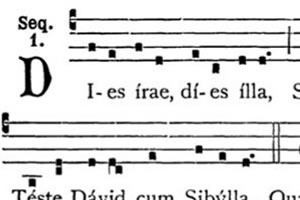
An extraordinary form of anger.
It was said Prospero and Roger Bacon could sing "all the way through to the end" this Latin hymn (The Face in the Frost, vii).
Dies irae (Latin: "Day of Wrath") is a hymn best known from its use as a sequence in the Requiem (Mass for the Dead or Funeral Mass). An English version is found in various Anglican Communion service books. The melody is one of the most quoted in musical literature, appearing in the works of many composers. It appears in the Roman Missal of 1962, the last edition before the implementation of the revisions that occurred after the Second Vatican Council.
The Face in the Frost was published a few short years after Bellairs's stint of teaching at Shimer College. During his year on campus there was a rather volatile riff between the administration and faculty leading to a number of protests and eventual resignations, including Bellairs himself, who got in on the fun by taking part in a mock funeral march for the college. In a undated letter to his friend John Drew, Bellairs writes that a "violent faculty revolution" was taking place and that he too got to recite this (though probably not all "the way through to the end"):
Two nights ago I, dressed in a black cape belonging to an Episcopal priest here, led a funeral procession to the President's door. There were about 60 of us (which is good at a college of 450, most of whom are up on pot or don't give a shit what is happening), and behind me were pallbearers with a huge coffin and a choir I was leading in the Dies Irae and Requiem aeternam [1].
Alfred Myers noted the "ominous, treading melody that accompanies that chant has become something of a cliché in classical music circles, used by many composers. Perhaps the first to make secular use of it was Hector Berlioz in the last movement of the Symphony Fantastique. Rachmaninoff almost made a career in quoting it in various works of his. [2]"
References
- [1] Correspondence from John Bellairs to John Drew (undated; c. Feb. 22, 1967).
- [2] Correspondence with Alfred Myers.

No comments:
Post a Comment